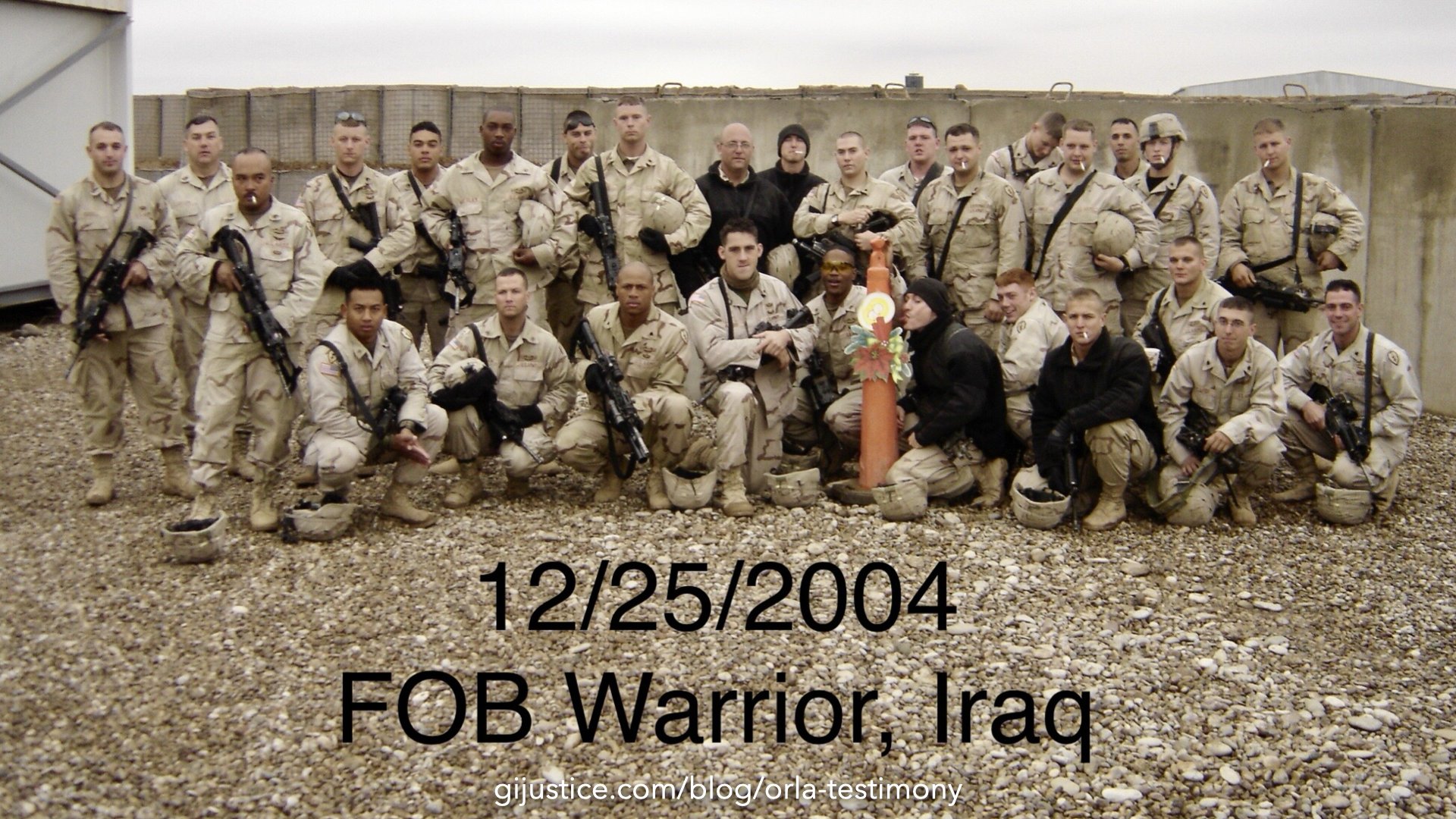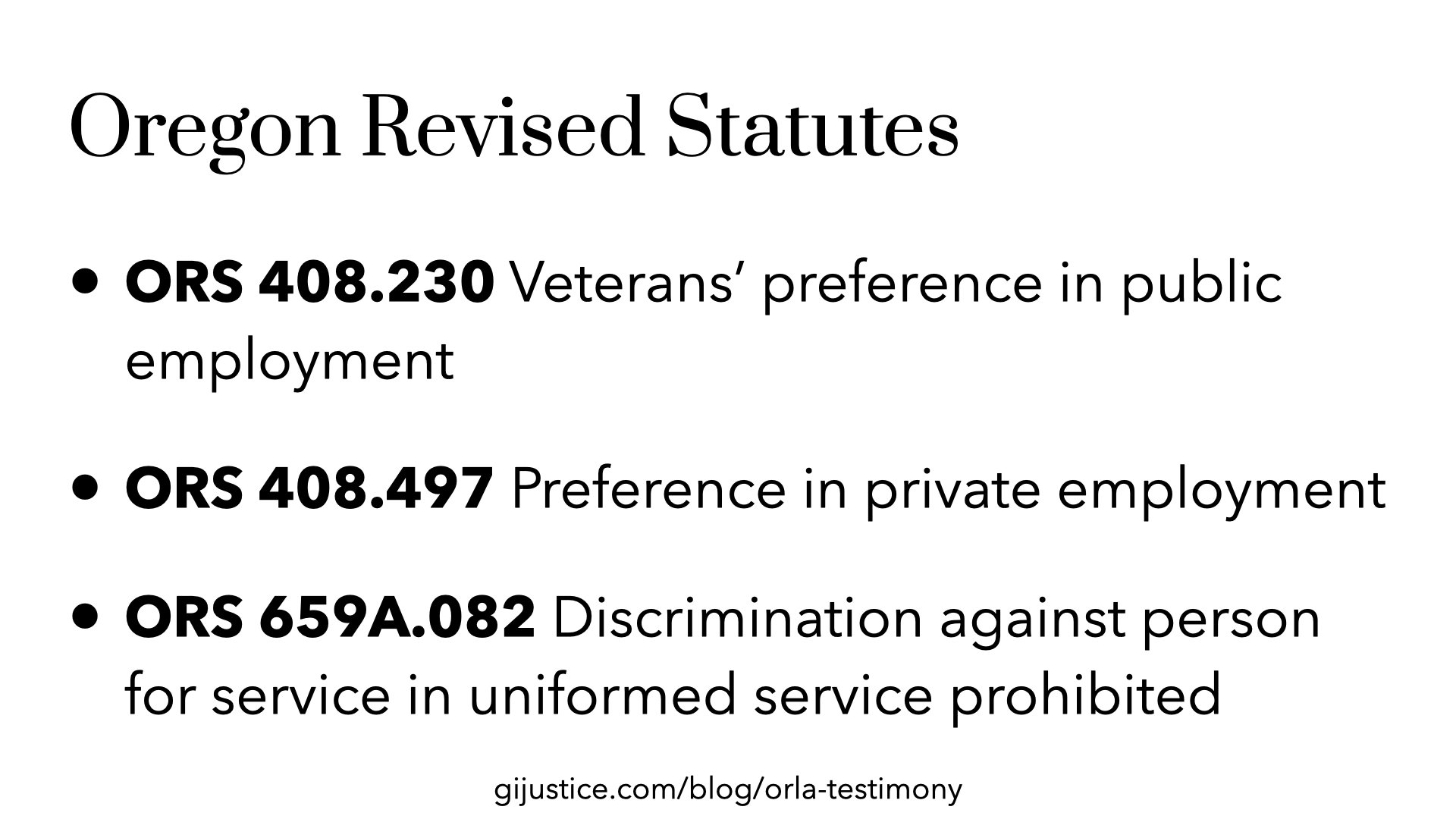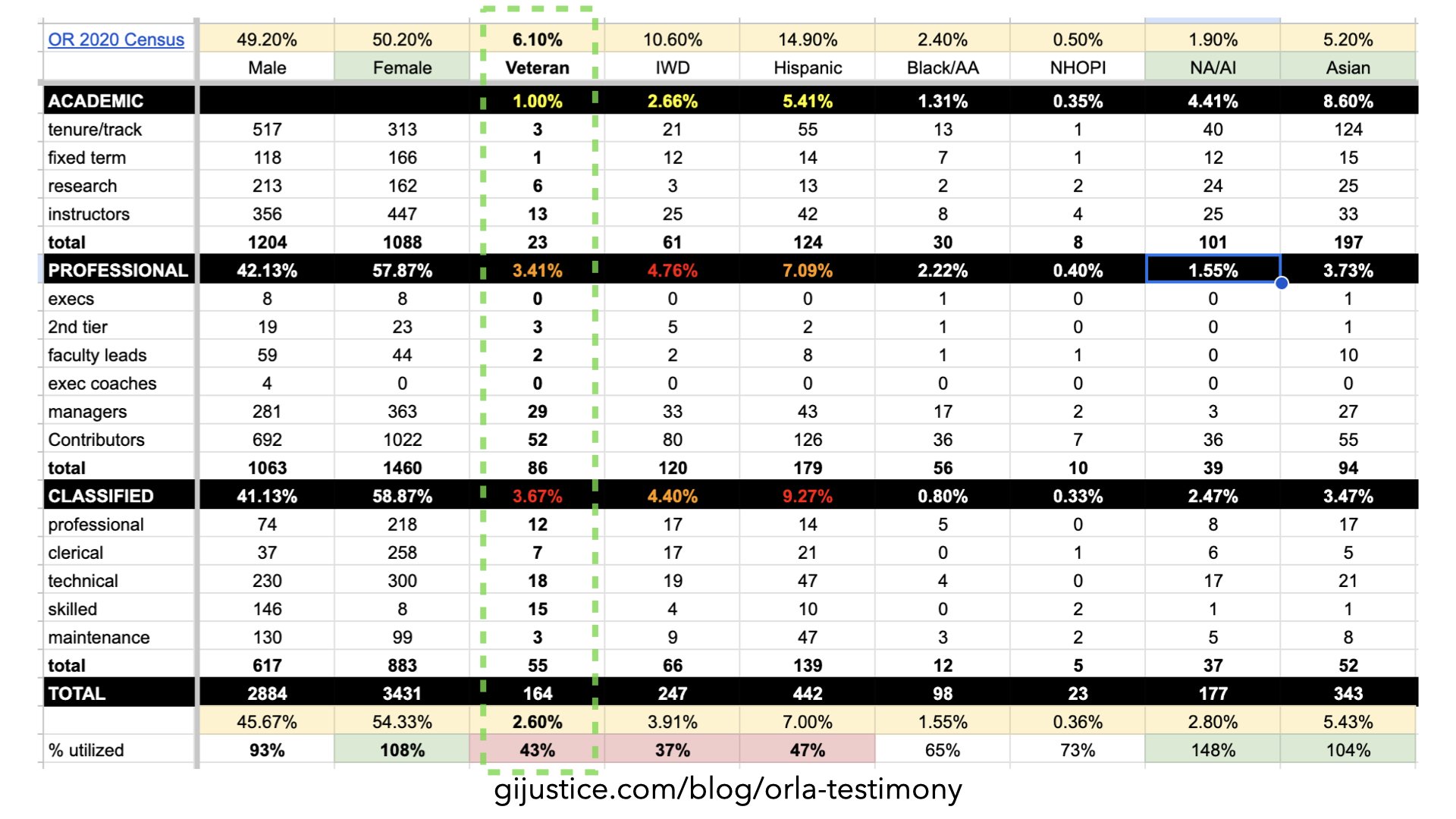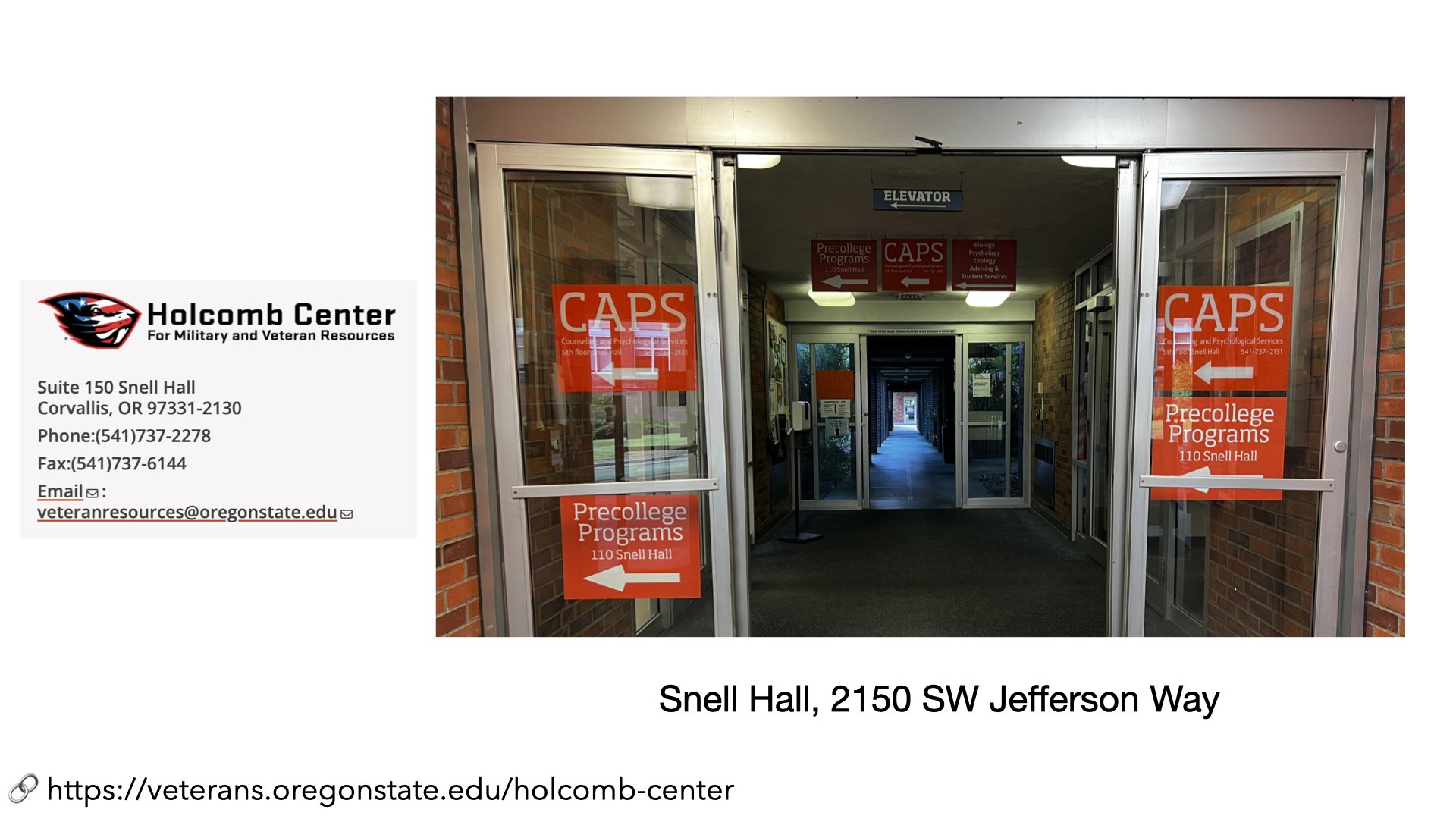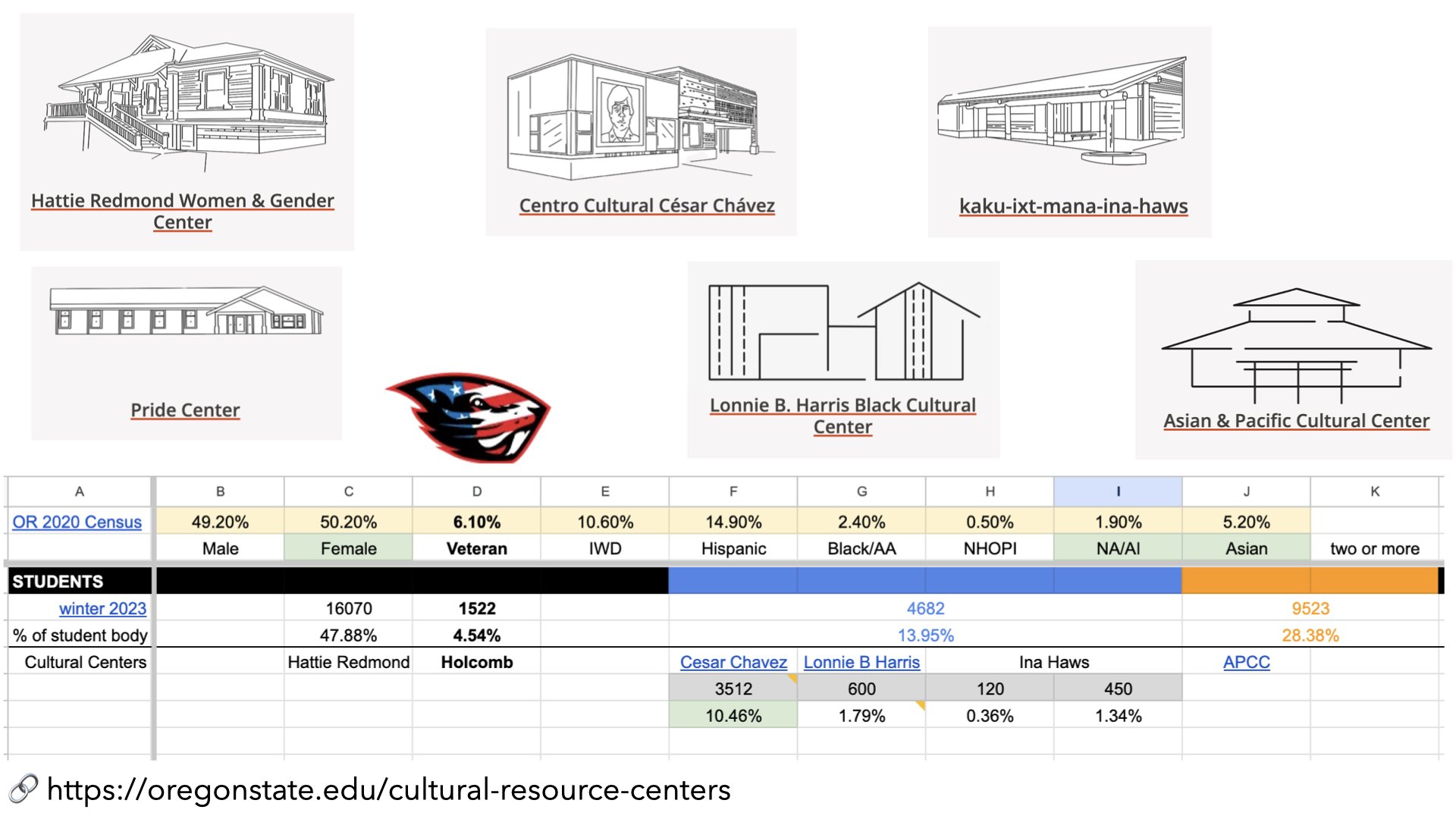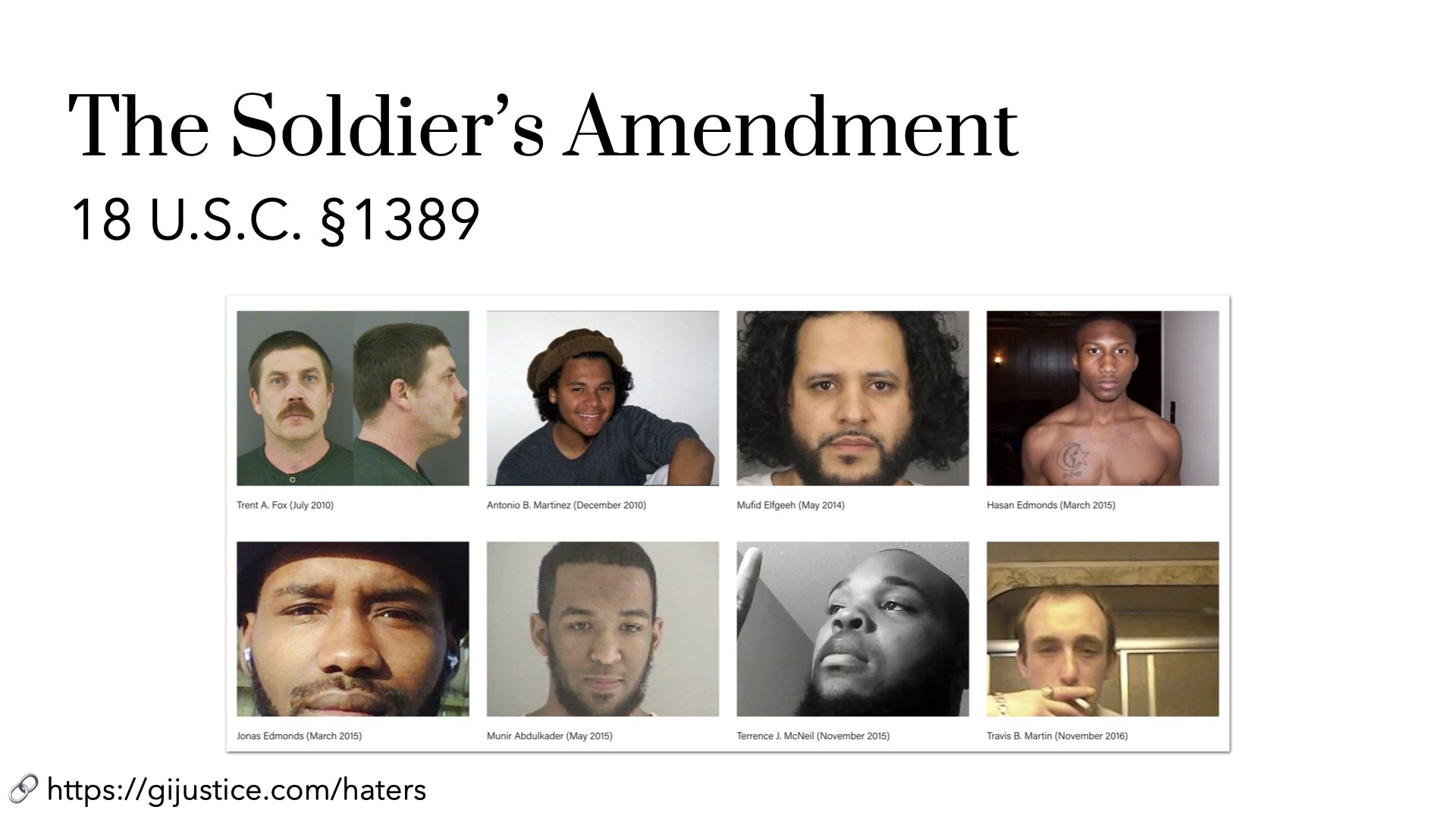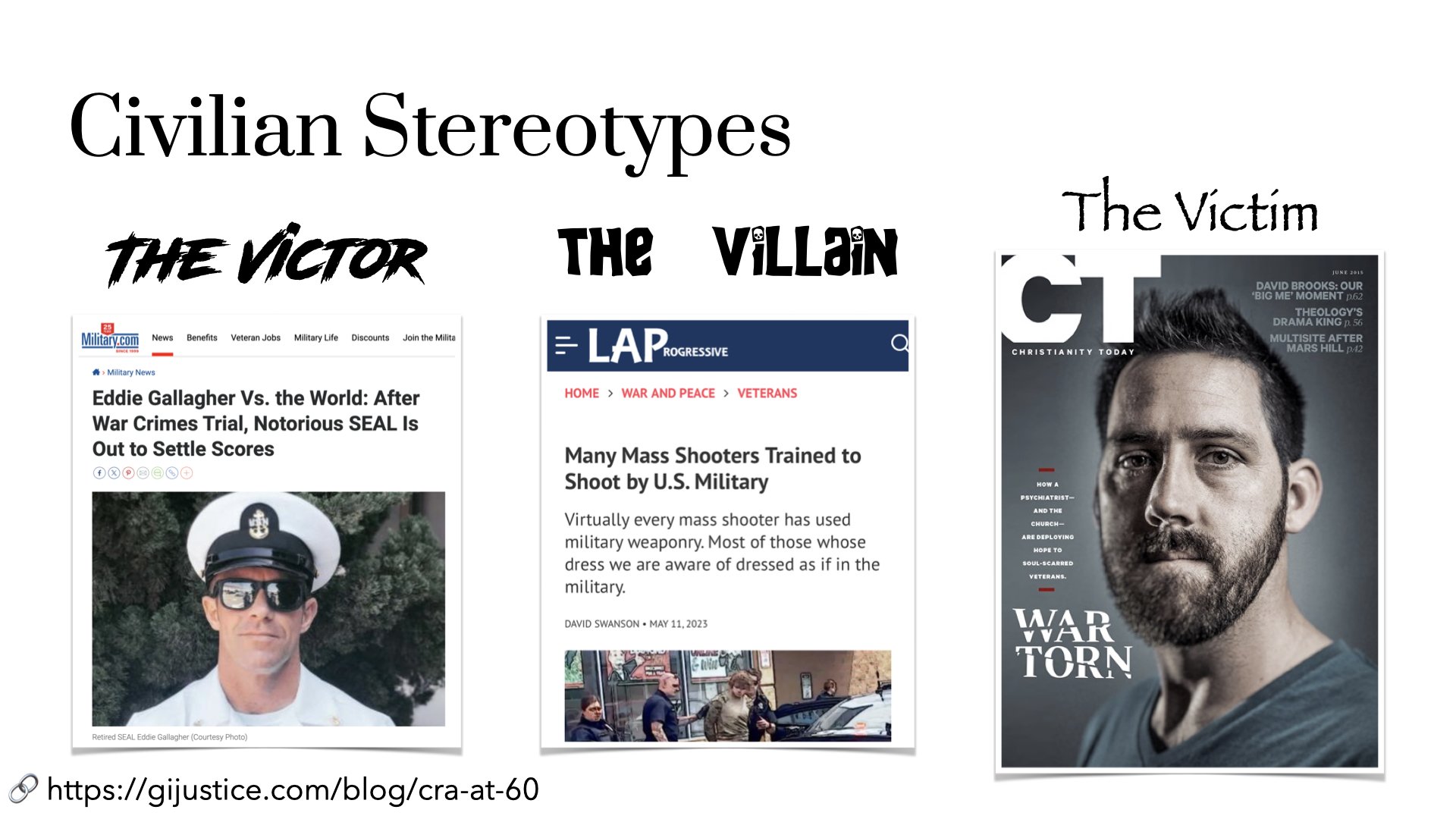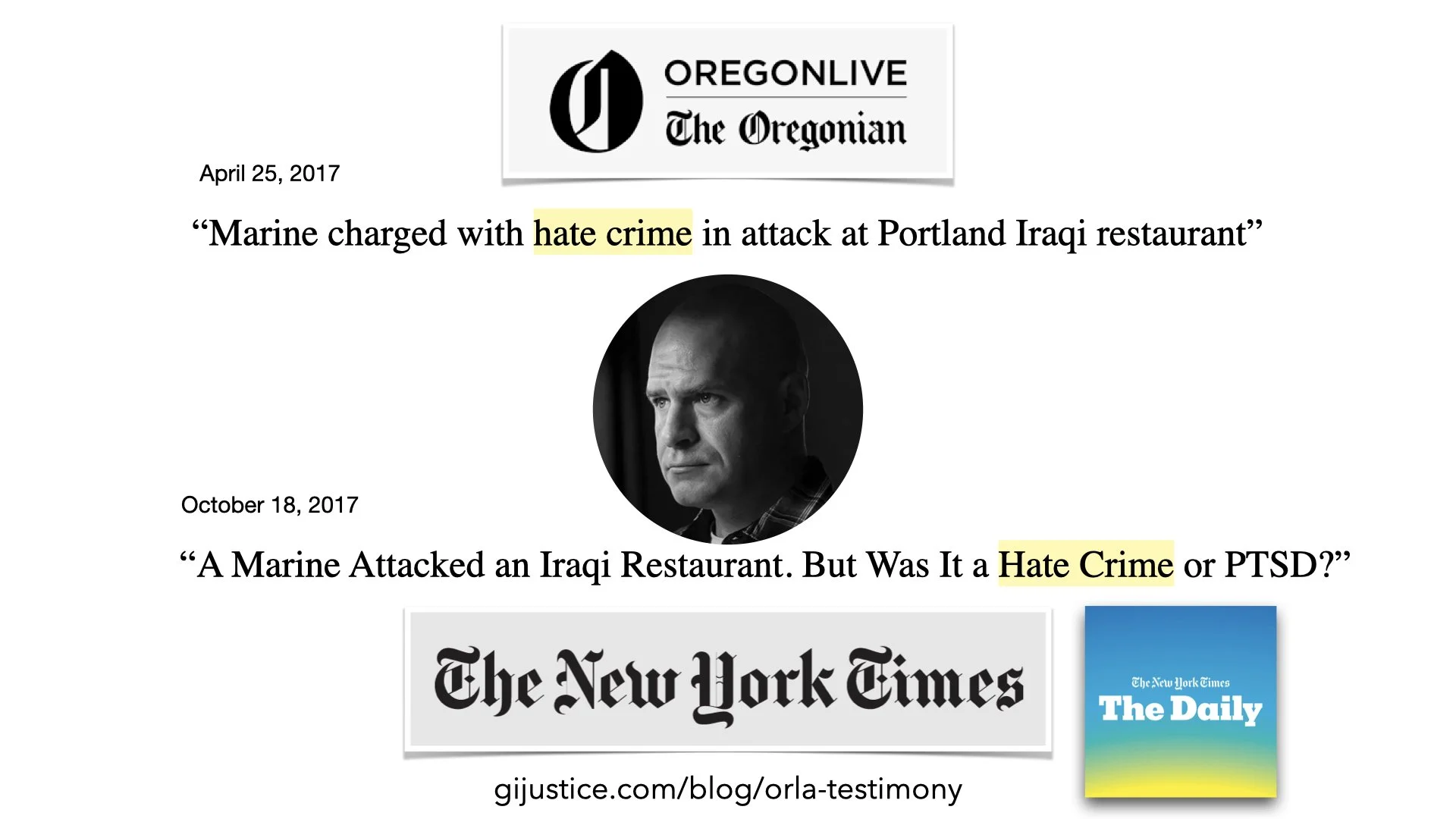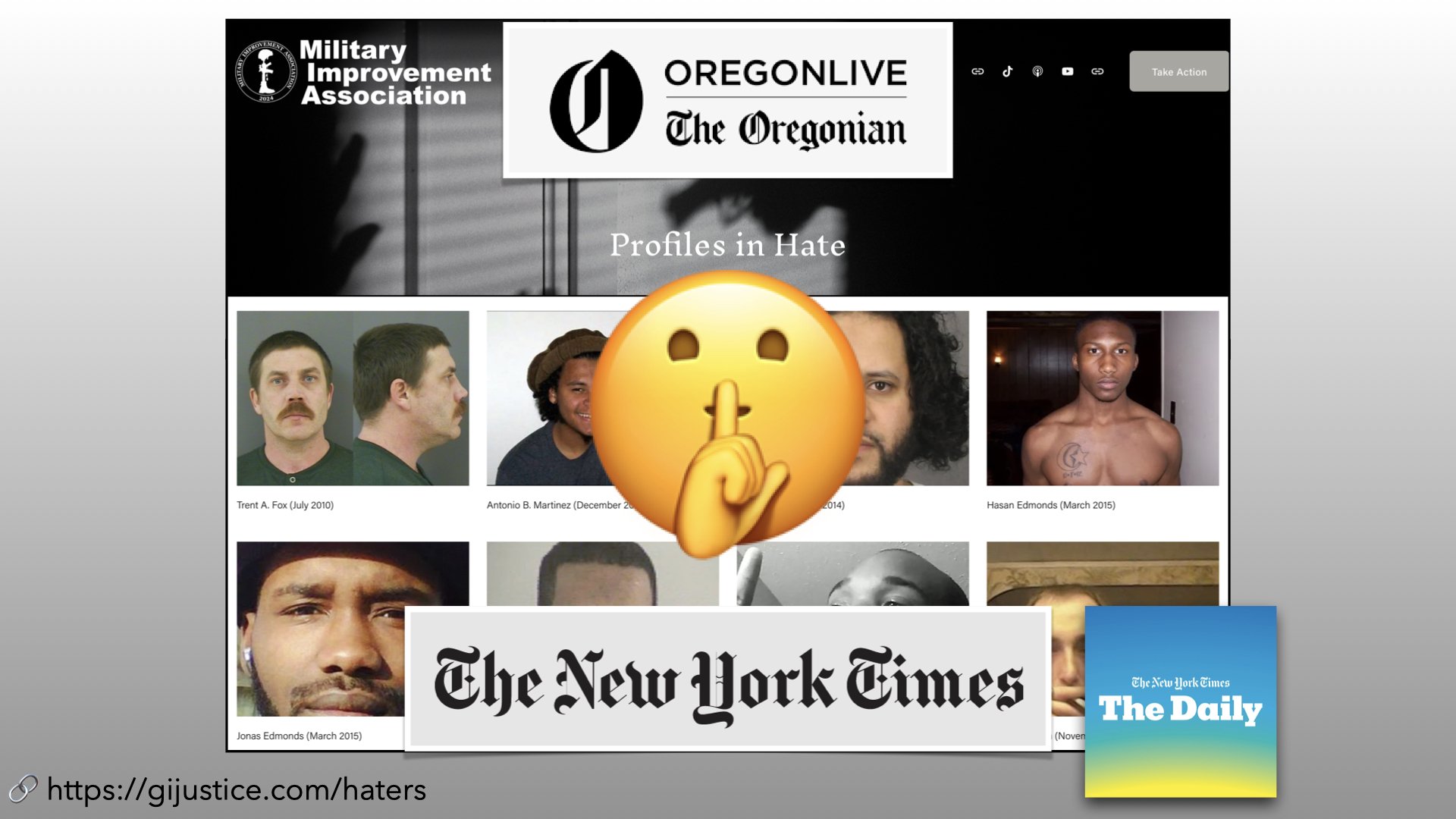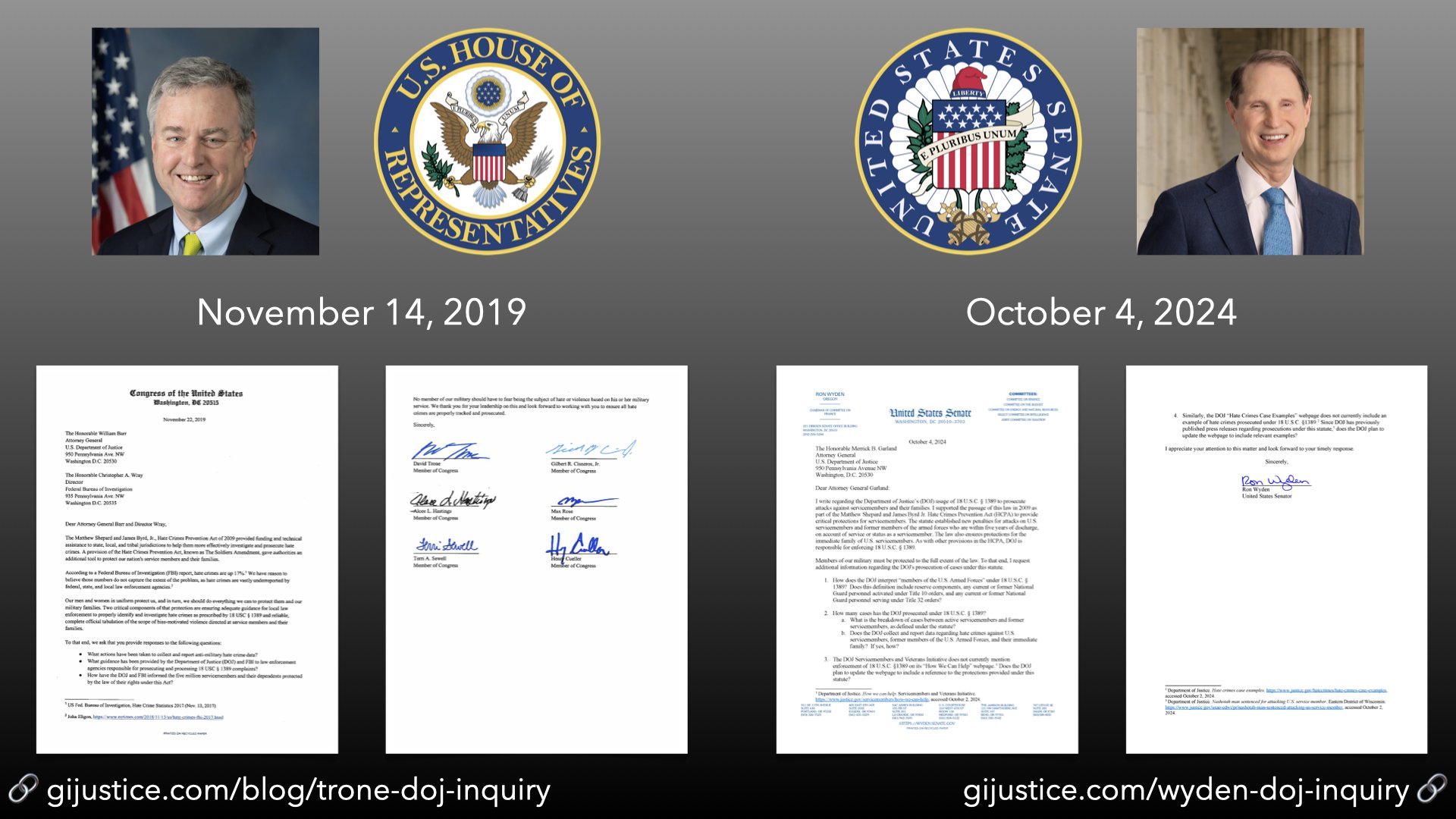ORLA Testimony
Remarks before the Oregon Senate Committee on Veterans delivered December 10, 2024;
My name is Logan M. Isaac, and I am here to provide context for two Legislative Concepts I authored that were submitted on September 27, 2024, by Vice Chair Senator Kim Thatcher and Representative James Hieb.
LC2560 urges Congress to conduct public hearings on anti-military bias and improve enforcement of hate crimes protections for military families.
LC2984 would be our nation’s first comprehensive military civil rights act
All citizens are supposed to be equal in a democracy, but States have more rights than their residents, and some citizens have more rights than others. As a soldier, I bet my life on liberty and justice for all. But as a veteran, I am deprived of the civil rights my service is supposed to secure, because GIJustice is MIA.
My Service Song
I spent six years in light infantry and airborne units serving our nation as an artillery forward observer. After deploying to an unjust and unpopular war, I came home to civilians profiting off service. When I called for accountability, they shored up their ill-gotten privilege by labelling me untrustworthy, mentally ill, and disrespectful. Through it all, I exhausted every opportunity to bring my lack of civil rights to public attention. If this is the first time you’ve heard of me, it’s not because I’ve been making myself invisible. Civilian bias has been throttling my voice, my mournful melody muffled by forces that prefer I open my wrists rather than my mouth.
We cannot be serious about military suicide until we are serious about human dignity for military families. Just because soldiers can take more shit than civilians doesn’t mean we should. Military training and culture is such that, when veterans discover their own finitude, self-harm is more intuitive than self-advocacy.
I refuse to live a life determined by a civilian gaze insisting I make myself small, colorless, dull, and numb. For caged birds, survival is a form of resistance. I’m here to sing of freedom, but it is up to each of you whether you hear my song as a fearful trill or a rallying cry. What will be clear by the end of my presentation is that GIJustice is MIA.
I will begin with the need for military civil rights in Oregon. Then I will speak about the Thatcher Memorial in the context of political and media silence.
MCRA (LC2560)
So, what does anti-military bias look like? For brevity, I’ll focus my testimony on employment, education, and hate crimes.
Employment
The Oregon Revised Statutes (ORS) only contain three laws intended to protect military families, none of which represent meaningful legislation. It’s a lesson I learned after my application to the adjunct pool at a public employer was ignored. The Executive Director for Human Resources at Linn Benton Community College refused to confirm ORS 408.230 was followed unless I filed a $25 “public records request.” I know accountability comes at a cost, but I didn’t expect it to have a price tag.
As for private employment, ORS 408.497 is no law at all, since Subsection 2 makes it optional; “A private, nonpublic employer may give preference…” (emphasis added) ORS 659A.082 appears to have some enforceability, but I could find no case law other than Eric C. Bush v. City of Prineville, which dealt mostly with attorney’s fees in the case of a National Guard Major General. As far as I can tell, Grunts like myself have no meaningful employment protections in Oregon state law because GIJustice is MIA.
Education
As a resident of Benton County and an aspiring academic, Oregon State University represents the closest opportunity for me to complete a terminal degree and enter the professional workforce. But data suggests OSU is a hostile environment for veterans.
According to the most recent Equal Opportunity and Access Report, veterans are disproportionately represented in the lowest tiers of university employment.
The diminishing representation is a trend at OSU. Although responsible for the funding and construction of Memorial Union after WWI, veterans voluntarily moved to Snell Hall in 2019.
But if you’re looking for battle buddies at the address listed online, you’re met with seven arrows pointing you away from the vet center, like a warning label, “Proceed with caution!”
I know how important it is for vet centers to be able to offer anonymity and respite from civilian bias, but invisibility should be an option, not an expectation. Despite serving the third largest student population, the OSU veteran center doesn’t get the same treatment as other centers, maybe because OSU thinks the military has no culture?
Sequestering military students penalizes humility while making invisibility non-negotiable, an echo of the refrain beaten into us at boot camp; shut up and drive on! You think veterans don’t know? Check the EOA data on Discrimination and Harassment Complaints.
Soldiers learn to keep our heads down because when you speak up, you get shot down. As we’ll see with Hate Crimes, civilian bias is just there to make sure we don’t forget our training. And if we don’t silence ourselves, civilian journalists and politicians will gladly do it for us, because GIJustice is MIA.
Hate crimes
On July 4, 2010, my local American Legion Hall in Albany was burned to the ground in a three alarm fire. It took five months and the assistance of federal agencies for local law enforcement to finally arrest Trent Allen Fox. After passing a mental exam, he took a plea deal that allowed him to avoid trial, leaving members of the American Legion Post 10 without an answer as to “the why of the matter.”
Eight months before the blaze, Congress passed the Hate Crimes Prevention Act of 2009. Section 4712 of the HCPA, known as The Soldiers Amendment, created protections from hate and bias for soldiers and their Dependents for up to five years after discharge. In his speech introducing the landmark bill, President Barack Obama made no mention of the Soldiers Amendment; a chilling precedent subsequent administrations have shamelessly maintained, from the US Commission on Civil Rights and the EEOC to the Departments of Labor, Education, and Justice.
The “Prohibition on attacks on United States servicemen on account of service,” 18 U.S.C. §1389, has never been enforced by the FBI. Not when Trent Fox burned down a Legion Post; Not when Antonio Martinez targeted the enlisted soldiers of a recruiting station in Baltimore. Not when Mufid Elfgeeh targeted regulars of his New York City pizza parlor coming home from deployment. Not when Munir Abdulkader targeted an entire military family in Cincinnati, including their child, for a televised beheading.
Their targets are “G.I. Does” because soldiers’ identities are the only part of them that receive meaningful protections. America prefers its sacrificial lambs nameless and faceless, every soldier a no-body for every body except their own body. Military suicide is the collateral damage of civilian privilege because GIJustice is MIA.
To conclude, allow me to draw our attention to the moral failure of the so-called fourth estate in order to provide the rationale for the Thatcher Memorial.
Memorial (LC2984)
The Press
Having a “Free Press” used to mean protecting journalists from political influence, but now it names the price American consumers expect to pay for things to which we feel entitled, like freedom. In an attention economy like ours, “Salaries are paid with the ads, not the words.” When sensationalism is what sells, service must be sensationalized just to be noticed…
Civilian Bias sorts soldiers into one of three stereotypes; Victor, Villain, or Victim;
The Victor instills pride, as though our war heroes can do no wrong on our behalf.
The Villain evokes panic, like flexing your index finger is a specialized skill…
The Victim deserves pity, as if soldiers have everything to receive and nothing to give.
Responsibility is the price of power; the decline of journalism is not the fault of consumers. Journalists turn a blind eye to civilian bias because they’re civilians blinded by their own bias, from powerhouses like The New York Times to our own The Oregonian.
After a veteran was charged with intimidation in 2017, both outlets called it a hate crime as though veterans are only newsworthy as perpetrators, not as survivors, because GIJustice is MIA.
The Memorial
Civilian stereotypes of soldiers persist because there is a grain of truth in them. But when a few grains get a disproportionate amount of the resources, civilian stereotypes become silos for Americans to sort everyone from friends and family to complete strangers. Military families are a minority governed by elected officials who do not represent them. Civil rights are the political expression of human dignity; my life has no political value if laws protecting it go unenforced.
FBI Director Christopher Wray has already ignored two Congressional Inquiries asking him why the Soldiers Amendment has not been enforced; the first from the House of Representatives in 2019 and the second from our own senior Senator just two months ago. The Thatcher Memorial would be the third Legislative attempt to hold Executive agencies accountable, but it will only succeed if the Press and Legislators alike demand better stories be told about soldiers and veterans. Military families need Civilian Allies because GIJustice is MIA.
Conclusion
I am tired of being labelled untrustworthy, mentally ill, and disrespectful for asking why my family and I are denied the rights my own service supposedly secures. I’ve petitioned Congress, the press, veteran service organizations, the list could go on.
There are now two Legislative Concepts set for consideration by the most powerful entity in our union, a State Legislative Assembly. These concepts need sponsors before session begins in January; who will step up to the mic to sing with me of freedom? “At best, [I’ll] feel a little remedy, at worst, the world will sing along.” GIJustice may be MIA, but don’t let it be dead on arrival…
I ask for the time and opportunity to respond to any questions or comments the Committee may have.

